MercoPress. South Atlantic News Agency
Tag: Argentina
-
Wednesday, August 18th 2010 - 05:16 UTC
Argentine Catholic Church reiterates “concern” with insecurity increase
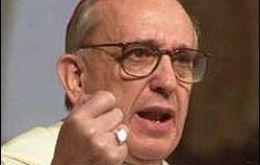
The Catholic Church again expressed “concern” about the increase in crime and insecurity during the opening of the 156th Episcopate Permanent Committee Summit presided by Cardinal Jorge Bergoglio.
-
Tuesday, August 17th 2010 - 09:17 UTC
Tourists arriving in Argentina during June increased 29.7% over a year ago

The number of tourists that arrived in Argentina during June increased 29.7% compared to the same month last year, according to a government report.
-
Tuesday, August 17th 2010 - 08:56 UTC
“Argentina/UK relation must go beyond the Falklands/Malvinas conflict”

The Argentina/UK relation must go beyond the Falklands/Malvinas conflict, said British ambassador Shan Morgan during a recent visit to Salta, one of Argentina’s most northern provinces famous for its landscape and agro-industry potential. She also praised Argentine labour and talent and was hopeful a trade agreement could soon be reached with the European Union.
-
Monday, August 16th 2010 - 04:52 UTC
It is official: Cristina or Nestor will be running for president in 2011
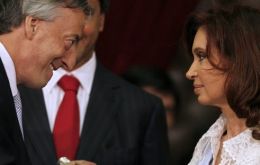
Argentine Cabinet Chief Aníbal Fernández said Sunday that either Néstor Kirchner or Cristina Fernández de Kirchner would be the candidates for the 2011 presidential elections from the ruling party.
-
Friday, August 13th 2010 - 07:00 UTC
“Discriminatory trade” measures could limit Chinese interest in Argentina

As China is gaining ever wider economic influence, Argentina runs the risk of losing the opportunity to benefit from the trend by keeping discriminatory measures against Chinese products, an Argentine expert warned.
-
Friday, August 13th 2010 - 06:39 UTC
Argentine wheat farmers slash land sown to a 111 year low, says FT

British newspaper “The Financial Times” has run a story focusing on Argentina's wheat production, explaining that due to export limits and taxes, “farmers have slashed the land sown with wheat to a 111-year low” and cereal exports “have been halved over the past five years.”
-
Friday, August 13th 2010 - 04:06 UTC
Asian and Latinamerican corporations buying Argentine assets

In the nineties most Argentine companies were purchased by companies with headquarters in New York or Madrid but in this decade they come from less glamorous countries: China, India, Brazil, Russia and unsuspected places such as Mexico, Peru and Colombia.
-
Tuesday, August 10th 2010 - 11:51 UTC
Basic Foods’ Basket in Argentina increased 35.9% in twelve months
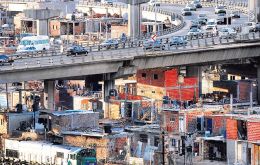
The Basic Foods Basket, CBA, an index from Argentina’s Foundation for Latin American Economic Research (FIEL) increased 0.6% in July compared to the previous month, 21% in the first seven months of the year, and 35.9% over a year ago.
-
Tuesday, August 10th 2010 - 01:30 UTC
Argentina confident it can issue debt in US dollars below 9% interest rate
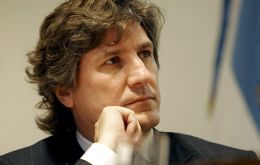
Argentine Economy Minister Amado Boudou confirmed what newspaper Ámbito Financiero had anticipated a week ago: the plan is to issue debt in US dollars but below the 9% mark, which with the current panorama may allow for an even lower percentage index.
-
Monday, August 9th 2010 - 07:46 UTC
Argentina's warning to would-be Euro deserters
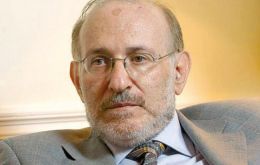
The tensions between the eurozone's north and south, and the complex and politically costly transfers of money required to dampen the euro crisis, have led many people to think the unthinkable: saving Europe's common currency may require that some countries abandon it.
